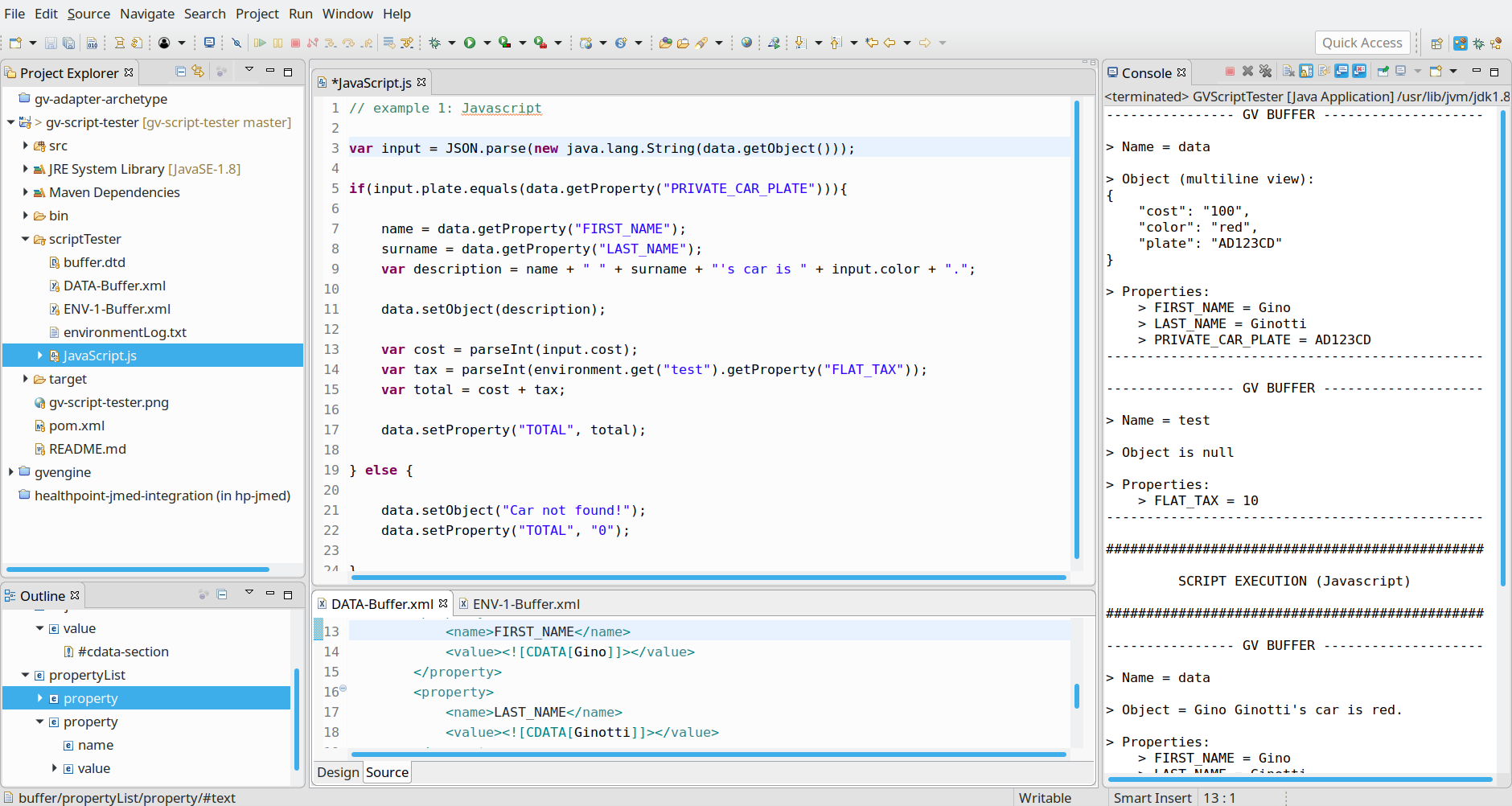GV Script Tester is an interactive environment where you can quickly run and debug a Javascript/Groovy/Python script using the gv-engine java classes. By setting up the gvbuffers with the related properties, it can execute the script by showing the status of the involved gvbuffers before and after the script execution.
The installation is very simple, just clone gv-script-tester, open the project with your favourite IDE and than import gv-base project in the gv-script-tester build path configuration.
To run a Javascript script, write into JavaScript.js the script that you want to execute, set LANGUAGE = "JavaScript" in Constants.java, than run GVScriptTester.java as a java application. (Try to run example 1: Javascript)
GVScriptTester -> tester/execution/ [GVScriptTester.java]
JavaScript body -> scriptTester/script/ [JavaScript.js]
Javascript abilitation -> src/tester/settings/ [Constants.java]
To run a Groovy script, write into GroovyScript.groovy the script that you want to execute, set LANGUAGE = "Groovy" in Constants.java, than run GVScriptTester.java as a java application. (Try to run example 2 - Groovy script)
GVScriptTester -> tester/execution/ [GVScriptTester.java]
Groovy Script body -> scriptTester/script/ [GroovyScript.groovy]
Groovy abilitation -> src/tester/settings/ [Constants.java]
Note: If your script is a function with a boolean return, set IS_CONDITION = true
(Try to run example 3 - Groovy script with boolean return)
To edit the current (input) GVBuffer object or its properties, you have to edit the file DATA-Buffer.xml.
Current buffer content -> scriptTester/buffer/ [DATA-Buffer.xml]
To add an additional buffer, you have to add an additional ENV-[buffer number]-Buffer.xml file for the buffer object and the related properties. After any execution, buffers are saved in xml format in the output folder.
You can also setup xmlp properties by adding them in scriptTester/buffer/xmlp.json.
TIPS: you can exclude a buffer setting its name as a void string (buffer name="").
Current buffer object -> scriptTester/buffer/ [DATA-Buffer.xml]
Additional buffer object -> scriptTester/buffer/ [ENV-1-Buffer.xml]
Additional buffer object -> scriptTester/buffer/ [ENV-2-Buffer.xml]
. . . . . .
XMLP Properties -> scriptTester/buffer/ [xmlp.json]
Environment buffers log -> scriptTester/ [environmentLog.txt]
Buffers after execution (xml) -> output/ [BufferName.xml]
To edit execution GV-SriptTester settings, edit the file Constants.java.
GV-SriptTester settings -> src/tester/settings/ [Constants.java]
Script -> scriptTester/script/JavaScript.js:
// example 1: Javascript
var input = JSON.parse(new java.lang.String(data.getObject()));
if(input.plate.equals(data.getProperty("PRIVATE_CAR_PLATE"))){
name = data.getProperty("FIRST_NAME");
surname = data.getProperty("LAST_NAME");
var description = name + " " + surname + "'s car is " + input.color + ".";
data.setObject(description);
var cost = parseInt(input.cost);
var tax = parseInt(environment.get("test").getProperty("FLAT_TAX"));
var total = cost + tax;
data.setProperty("TOTAL", total);
} else {
data.setObject("Car not found!");
data.setProperty("TOTAL", "0");
}
Data buffer -> scriptTester/buffer/DATA-Buffer.xml:
<?xml version="1.0" encoding="UTF-8"?>
<!DOCTYPE note SYSTEM "buffer.dtd">
<buffer name="data">
<object>
<value><![CDATA[{
"plate":"AD123CD",
"color":"red",
"cost":"100"
}]]></value>
</object>
<propertyList>
<property>
<name>FIRST_NAME</name>
<value><![CDATA[Gino]]></value>
</property>
<property>
<name>LAST_NAME</name>
<value><![CDATA[Ginotti]]></value>
</property>
<property>
<name>PRIVATE_CAR_PLATE</name>
<value><![CDATA[AD123CD]]></value>
</property>Editing gv-script-tester_README.md at master · Luke460_gv-script-tester
</propertyList>
</buffer>
Test buffer (just another buffer) -> scriptTester/buffer/ENV-1-Buffer.xml:
<?xml version="1.0" encoding="UTF-8"?>
<!DOCTYPE note SYSTEM "buffer.dtd">
<buffer name="test">
<object>
</object>
<propertyList>
<property>
<name>FLAT_TAX</name>
<value><![CDATA[10]]></value>
</property>
</propertyList>
</buffer>
Execution output: (this example is preconfigured, so you can just run GVScriptTester.java as a java application)
---------------- GV BUFFER --------------------
> Name = data
> Object (multiline view):
{
"cost": "100",
"color": "red",
"plate": "AD123CD"
}
> Properties:
> FIRST_NAME = Gino
> LAST_NAME = Ginotti
> PRIVATE_CAR_PLATE = AD123CD
-----------------------------------------------
---------------- GV BUFFER --------------------
> Name = test
> Object is null
> Properties:
> FLAT_TAX = 10
-----------------------------------------------
###############################################
SCRIPT EXECUTION (Javascript)
###############################################
---------------- GV BUFFER --------------------
> Name = data
> Object = Gino Ginotti's car is red.
> Properties:
> FIRST_NAME = Gino
> LAST_NAME = Ginotti
> PRIVATE_CAR_PLATE = AD123CD
> TOTAL = 110
-----------------------------------------------
---------------- GV BUFFER --------------------
> Name = test
> Object is null
> Properties:
> FLAT_TAX = 10
-----------------------------------------------
TIPS: remember to set LANGUAGE = "Groovy"
Script -> scriptTester/script/GroovyScript.groovy:
String inputJsonString = data.getObject().toString();
org.json.JSONObject inputJson = new org.json.JSONObject(inputJsonString);
int number = inputJson.getJSONObject("player").getInt("number");
String name = inputJson.getJSONObject("player").getString("name");
String surname = inputJson.getJSONObject("player").getString("surname");
String code = (name + surname + number).toUpperCase();
org.json.JSONObject outputJson = new org.json.JSONObject();
outputJson.put("number", number);
outputJson.put("code", code);
data.setProperty("OUTPUT_JSON", outputJson.toString());
Data buffer -> scriptTester/buffer/DATA-Buffer.xml:
<?xml version="1.0" encoding="UTF-8"?>
<!DOCTYPE note SYSTEM "buffer.dtd">
<buffer name="data">
<object>
<value><![CDATA[{
"player": {
"name": "Pino",
"surname": "Pinotti",
"number": 10
}
}]]></value>
</object>
<propertyList></propertyList>
</buffer>
Execution output:
---------------- GV BUFFER --------------------
> Name = data
> Object (multiline view):
{"player": {
"number": 10,
"surname": "Pinotti",
"name": "Pino"
}}
> No Properties
-----------------------------------------------
###############################################
SCRIPT EXECUTION (Groovy)
###############################################
---------------- GV BUFFER --------------------
> Name = data
> Object (multiline view):
{"player": {
"number": 10,
"surname": "Pinotti",
"name": "Pino"
}}
> Properties:
> OUTPUT_JSON (multiline view):
{
"number": 10,
"code": "PINOPINOTTI10"
}
-----------------------------------------------
Have fun making this simple example work!
TIPS: remember to set IS_FUNCTION = true
if(environment.get("test-buffer").getProperty("example").equals("hello!")) {
return true;
} else {
return false;
}
# example 4: ToUpper
text = data.getObject()
data.setProperty("input",text)
outputText = text.upper()
data.setProperty("output",outputText)
data.setObject(outputText)
